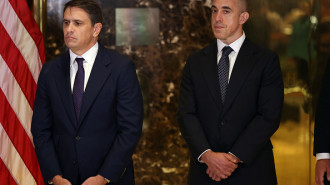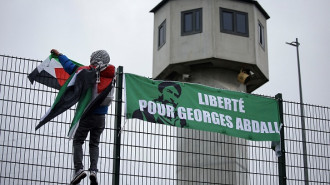Yemen UAE-backed force recaptures al-Qaeda stronghold
An elite Yemeni force formed by the United Arab Emirates captured the town of Mahfad, an al-Qaeda stronghold in the southern province of Abyan, a military official said on Sunday.
"Our forces have entered Mahfad and seized the highway," Colonel Munir al-Yafei told AFP.
The key highway connects government stronghold Aden to Ataq, capital of oil-rich Shabwa province.
"We have erected roadblocks and will soon start scouring valleys and mountains," the source said.
The advance was made without much resistance from al-Qaeda, whose fighters for months have been retreating without a fight against government troops in the area.
However, a truck driven by a suicide bomber exploded when the elite forces entered Mahfad, killing one soldier and wounding five, Yafei said.
Mahfad had become one of the main al-Qaeda strongholds in southern Yemen and many militants retreated, fleeing the advance in Aden, Abyan, Lahij and Shabwa provinces.
Al-Qaeda in the Arabian Peninsula (AQAP) has flourished in the chaos of Yemen's civil war, which pits the UAE and Saudi-backed government of President Abedrabbo Mansour Hadi against Houthi rebels.
The UAE has been playing a key role in a Saudi-led military campaign to prop up Hadi's government after the Houthis forced him into exile.
Emirati troops and Yemeni militias loyal to Abu Dhabi have established a foothold in the south and central regions of the country.
Abu Dhabi's presence has been described by some Yemenis as an "occupation" and human rights groups have slammed the alleged torture of prisoners by Emirati troops.
In August, Emirati-trained Yemeni Special Forces launched a US-backed operation against AQAP, also the target of a long-running US drone campaign.
But in February 2016, coalition forces and their allies were accused of fighting alongside the militants, after a BBC journalist who was filming just a few miles from the Taiz frontlines said she was told not to film a group seen participating with the coalition because they were angered by the presence of a woman.
The group, she was told, was Ansar al-Sharia, an al-Qaeda affiliate in the Araban Peninsula (AQAP).
The coalition denied collaborating with al-Qaeda militants, and began their campaign against the group just a month later.
In April 2016, Special Forces from the UAE and Yemeni government fighters forced AQAP militants to allegedly withdraw from the former militant-held port city of Mukalla, debunking claims by the Saudi-led coalition suggesting a fierce battle killed 800 AQAP militants.
More than 10,000 people have been killed in Yemen since the coalition intervened militarily in March 2015, according to United Nations figures.
Another 2,100 have died of cholera this year.
In September, the UN Human Rights Council agreed to send war crimes investigators to Yemen, despite repeated resistance from Saudi Arabia, which has been accused of war crimes in the poverty-stricken country.







 Follow the Middle East's top stories in English at The New Arab on Google News
Follow the Middle East's top stories in English at The New Arab on Google News


![Aid Gaza [Getty]](/sites/default/files/styles/image_330x185/public/2010004231.jpeg?h=cb957c44&itok=NpHeiZFt)